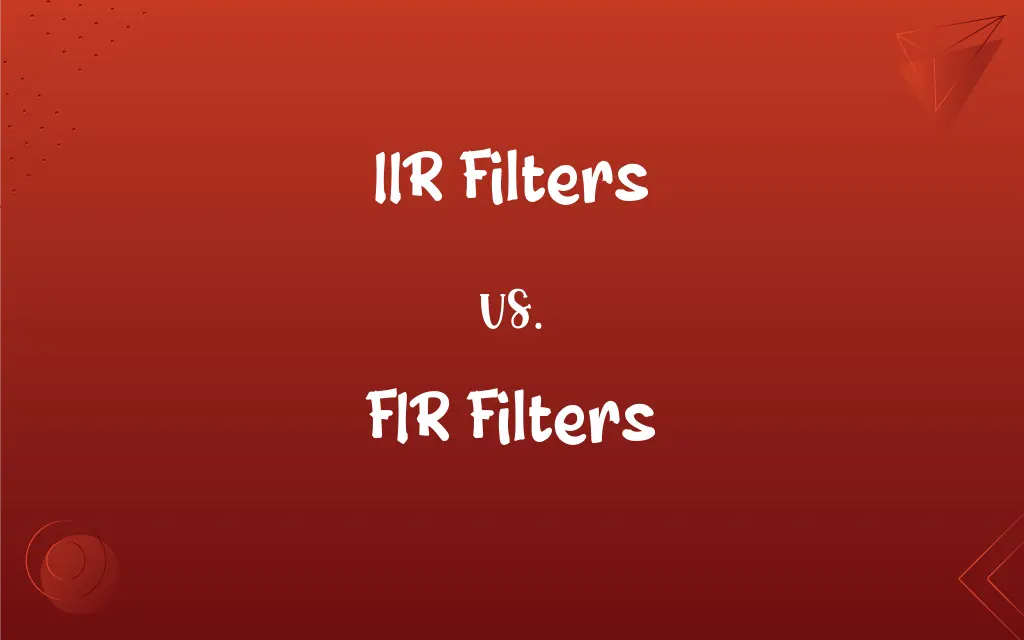IIR Filters vs. FIR Filters: What's the Difference?
Edited by Aimie Carlson || By Janet White || Published on February 14, 2024
IIR filters use feedback, potentially causing infinite impulse response; FIR filters don't use feedback, leading to finite impulse response.

Key Differences
IIR filters, or Infinite Impulse Response filters, are characterized by their use of feedback from output to input, creating an impulse response that theoretically lasts forever. In contrast, FIR filters, or Finite Impulse Response filters, do not use feedback. The absence of feedback in FIR filters results in an impulse response that is limited to the duration of the input signal.
The design of IIR filters often leads to more complex algorithms due to the recursive nature of their feedback mechanisms. This complexity can result in more computational effort compared to FIR filters. On the other hand, FIR filters, with their non-recursive structure, are generally simpler to implement and understand. This simplicity often translates to easier and more predictable behavior, especially in terms of phase response.
In terms of stability, IIR filters can be unstable if not properly designed, as the feedback involved can potentially lead to unbounded output. FIR filters inherently avoid this problem as they do not incorporate feedback, making them always stable.
The phase response of IIR filters can be nonlinear, which might be undesirable in certain applications. FIR filters, in comparison, can easily achieve a linear phase response, which is often a crucial requirement in applications like data transmission and audio processing.
IIR filters are typically more efficient in achieving a specific filter response with a lower filter order than FIR filters. This efficiency can be significant in applications where computational resources are limited. However, FIR filters offer more flexibility and control over the shape and characteristics of the filter response.
ADVERTISEMENT
Comparison Chart
Feedback
Use feedback
Do not use feedback
Impulse Response
Potentially infinite
Finite
Stability
Can be unstable
Always stable
Phase Response
Can be nonlinear
Linear phase response is easier to achieve
Design Complexity
More complex, recursive
Simpler, non-recursive
ADVERTISEMENT
Filter Order Efficiency
Generally more efficient (lower order)
Less efficient (higher order) for the same response
IIR Filters and FIR Filters Definitions
IIR Filters
IIR filters are efficient in applications where filter order and computational resources are limited.
In battery-operated devices, IIR filters are preferred for their efficiency.
FIR Filters
FIR filters do not use feedback, leading to inherent stability.
The stability of FIR filters makes them suitable for critical signal processing tasks.
IIR Filters
IIR filters can exhibit stability issues due to their recursive nature.
Careful design is required to ensure an IIR filter doesn't become unstable.
FIR Filters
FIR filters have a finite impulse response, terminating after a set period.
FIR filters are used in digital systems to ensure a predictable response duration.
IIR Filters
IIR filters are digital filters with an impulse response that lasts indefinitely.
The echo in a hall is similar to an IIR filter effect.
FIR Filters
FIR filters are typically non-recursive and straightforward in design.
The simplicity of FIR filters allows for easy implementation in digital circuits.
IIR Filters
IIR filters incorporate feedback from previous outputs into their calculations.
An IIR filter's feedback loop makes it ideal for simulating reverberation.
FIR Filters
FIR filters often require a higher order than IIR filters for the same level of performance.
Higher computational resources might be needed for FIR filters in complex applications.
IIR Filters
IIR filters can achieve complex filter characteristics with fewer calculations.
Using an IIR filter reduces the computational load in real-time audio processing.
FIR Filters
FIR filters are often preferred for their linear phase response.
FIR filters maintain the waveform integrity in audio signal processing.
FAQs
What does IIR stand for?
IIR stands for Infinite Impulse Response.
Are IIR filters always stable?
No, IIR filters can become unstable if not properly designed due to their feedback mechanism.
What is the main difference between IIR and FIR filters?
IIR filters use feedback and can have an infinite impulse response, while FIR filters do not use feedback and have a finite impulse response.
Can FIR filters achieve a linear phase response?
Yes, FIR filters can easily achieve a linear phase response.
Do FIR filters have stability issues?
FIR filters are inherently stable as they do not use feedback.
Are IIR filters more efficient than FIR filters?
IIR filters are often more efficient in achieving a specific response with a lower filter order.
Can IIR filters be used for real-time processing?
Yes, IIR filters are suitable for real-time processing but require careful design to avoid instability.
Are FIR filters good for audio processing?
Yes, FIR filters are commonly used in audio processing due to their linear phase and stability.
What does FIR stand for?
FIR stands for Finite Impulse Response.
Which filter is easier to implement, IIR or FIR?
FIR filters are generally easier to implement due to their non-recursive nature.
Can IIR filters have a nonlinear phase response?
Yes, IIR filters can have a nonlinear phase response.
Are FIR filters used in digital signal processing?
Yes, FIR filters are widely used in digital signal processing.
Is feedback an essential feature of IIR filters?
Yes, feedback is a defining characteristic of IIR filters.
Can FIR filters be designed with arbitrary frequency responses?
Yes, FIR filters can be designed with arbitrary frequency responses.
Is it easier to design a linear phase filter with IIR or FIR?
It's easier to design a linear phase filter with FIR filters.
What is a key advantage of IIR filters over FIR filters?
A key advantage of IIR filters is their efficiency in achieving complex filter characteristics with fewer calculations.
Are IIR filters suitable for applications requiring stable operation?
IIR filters can be used in stable applications but require careful design to ensure stability.
Is the impulse response of FIR filters always finite?
Yes, the impulse response of FIR filters is always finite and limited to the duration of the input signal.
Do FIR filters require more computational resources?
Yes, FIR filters typically require more computational resources, especially for higher order filters.
Do FIR filters have a recursive structure?
No, FIR filters typically have a non-recursive structure.
About Author
Written by
Janet WhiteJanet White has been an esteemed writer and blogger for Difference Wiki. Holding a Master's degree in Science and Medical Journalism from the prestigious Boston University, she has consistently demonstrated her expertise and passion for her field. When she's not immersed in her work, Janet relishes her time exercising, delving into a good book, and cherishing moments with friends and family.
Edited by
Aimie CarlsonAimie Carlson, holding a master's degree in English literature, is a fervent English language enthusiast. She lends her writing talents to Difference Wiki, a prominent website that specializes in comparisons, offering readers insightful analyses that both captivate and inform.
































































